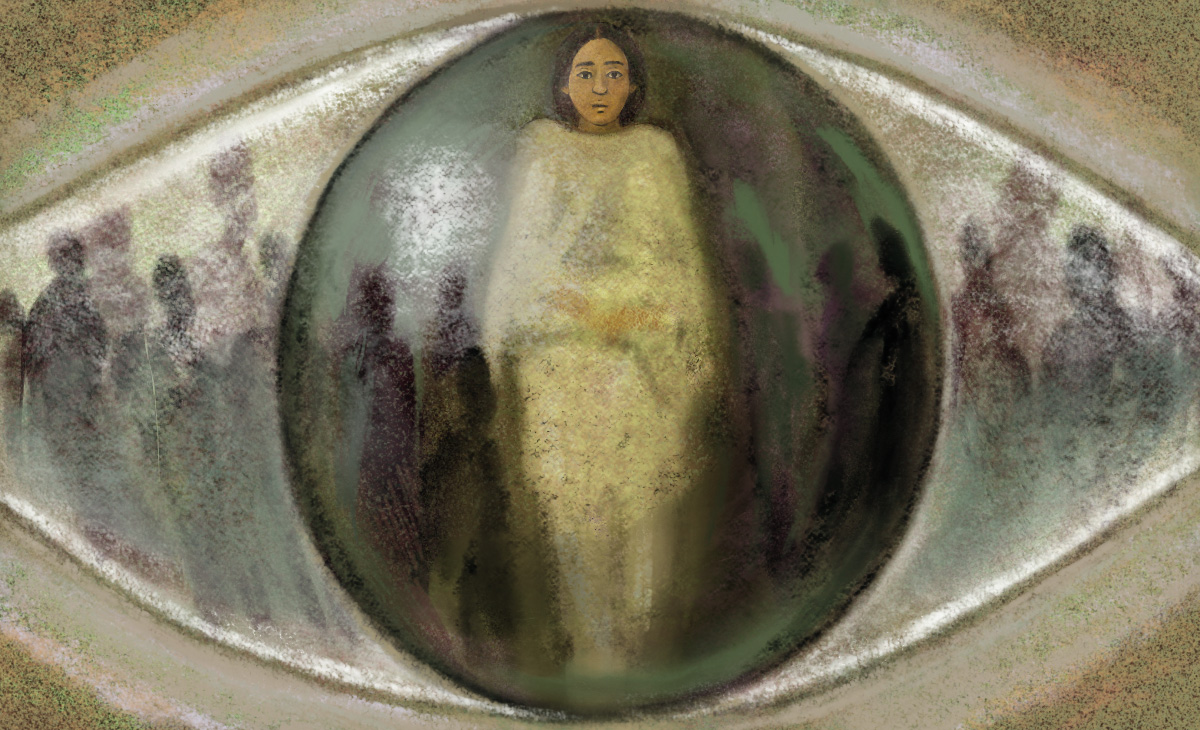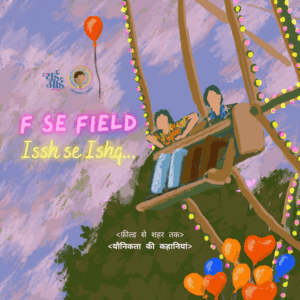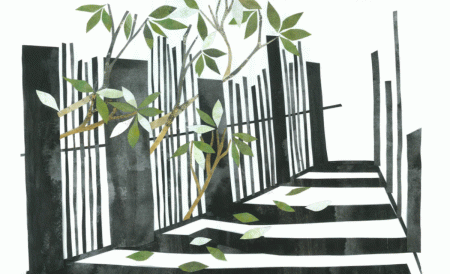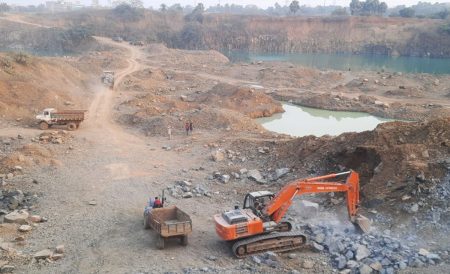The word samjhauta is synonymous with the phrase ‘to settle’. When a woman or a girl dies in the aftermath of violence, in most of the cases, her natal family and sasuraal get together to settle the matter as soon as possible. Her in-laws and her own parents set out to erase traces of her existence from their lives and home by closing the matter through an exchange of money. But what happens when parents decide to not settle, and undertake the long, arduous path to justice for their daughter? What does it mean to come to the decision that they will fight her case, despite the threats, the burden, the pain, and the uncertainty — in a system where violence against women is rare?
This essay by a caseworker from Vanangana, a women’s collective in Banda, gives a glimpse into one such case. How does a caseworker with her knowledge, her strategies, her persistence and sheer labour, nudge and guide parents through the maze of the legal system process, where at every checkpoint there is pressure to “just settle” and go home? What does it take to work your way through the judicial process?
Read this alongside First, They Broker a Deal For A Daughter’s Body. Now, They Get A Deal For Her Corpse, where the parents did settle.
The Third Eye worked with 12 caseworkers in rural and small town Uttar Pradesh, and through a process that included immersive writing, theatre-based pedagogies and year long workshops, the caseworkers became the lexicographers of The Caseworkers’ Dictionary of Violence.
When people talk about striking a deal in cases of violence against women, what I remember are the innumerable deaths. This is because when a woman is alive, society brokers a deal over her dowry and when she is dead, the deal is over her body. At the moment of her death, her home, her family, her community — everyone together is awash in a kind of shamelessness. Barely has the woman breathed her last when the village headman, the police and the in-laws, all conspire to push it under the carpet saying “what is done is done, let’s just bury the matter here”.
And then, the auction begins.
There is a samjhauta done on the amount of money to be given to her family.
The police are saved the bother of an investigation; the guilty are saved the bother of jailtime and the woman’s family is saved the bother of running around for justice.
It’s quite easy to take a woman’s life over any kind of dispute, be it big or small, just like how easy it is for the slaughterhouse owner to decide when it’s time to kill an animal in order to earn money from it. We get a lot of cases where we end up attending the mourning ceremony of the dead woman but we can do nothing for her. As caseworkers, we return with a lot of anger and disappointment within ourselves. Especially when we find ourselves standing in front of the corpse, knowing we can do nothing for her. I try my best that in such cases, no deal is brokered. And to get to that, we have to expend a lot of energy and persuade others involved in the situation. Sometimes we succeed in making them understand. But this is a challenging journey for the caseworker because after the death of a woman, often her own parents are to blame for not wanting to pursue justice for their dead daughter. If the parents truly desire justice, then it is hard for the guilty to avoid prison.
Let me tell you about such a case. This was in 2020 after the Covid lockdown. Sangita (name changed) from Chitrakoot district in Uttar Pradesh, was married to Vijay (name changed) from Banda district. Her in-laws had been harassing her for more dowry for a while. One day, the in-laws murdered her and made it look like suicide.
It took immense hard work and running around on my part to make this a legal case. I was tracking everything minute by minute. I left no stone unturned to make sure that her father and brother did not succumb to the pressure of doing a samjhauta with the family. I had first read about the case in the newspaper. I went where the incident took place. What I saw was extremely painful. Well, to begin with, nobody was willing to say anything. I somehow figured out where Sangita’s parents lived and decided to go there. They were in a very bad shape. I met the her brother and father, understood the details of the case and told them that we would help them in taking this case to court. I told them, “If you trust us, then know that you are not alone.”
They asked for two days to think about what they wanted to do. I gave them my number and my organisation’s card. I took their phone numbers and left. After two days, when I called them, they told me that they had gone to the police station and nobody had heard their complaint. At the police station, the Station House Officer (SHO) had called the in-laws and was talking about some exchange of money between the two parties. The SHO then turned away Sangita’s family saying that they should come when the post-mortem report arrives.
On hearing all this, I asked the father and brother just one question. “What do you want? Samjhauta or justice?” The father replied, “I know who all have killed my daughter and I want to send each one of them to jail.”
The very next day I called them to Banda, and made them fill a consent form, which would give us (the organisation) permission to take up the case. Then, I wrote their application and took them to the police station. The SHO was very angry finding me there and shouted at them, “Why have you brought her here with you? Wouldn’t I have written your report?” I said, “No problem, sir. Our work is the same, to help people. They have come from quite far. They have come for the second time today. It won’t be possible for them to come every day. Please write their report.” Anyway, the SHO took their application and told them to come back after two days but to call first. Their report would be written by then, and he said to me, “Madam, there is no need for you to come.”
Three days later, when I called the police station, I realised that my number has been put on their black list. Then I asked Sangita’s father to call them. Even his call wasn’t answered. The next day, again, we reached the police station and were aghast to see four or five people from Sangita’s in-laws’ family already sitting there. I went up to the SHO and said to him, “Sir, these people are roaming freely in the police station. Why are you not writing our report and arresting them?”, to which the SHO replied, “Madam, this is our work, you go and sit outside and don’t lecture us on how to do things.” I stood there, and calmly said, “Sir, I am only reminding you of your duty.” He heard me and then asked me to send the father and the brother to his room. I sent them inside and waited outside.
Over the next two hours, the SHO kept them seated in his room just to communicate that it was better to do a samjhauta otherwise they would face a lot of trouble. Eventually, I went inside and asked them what happened and what they had talked about. It was the SHO who replied. He said, “Change the application, and I will register a case of suicide and not murder.” On hearing this, I replied, “A case of murder will be registered in this very police station and you will be the one to register it.” Then I left.
After this, we met the Superintendent Police (SP) and the Deputy Inspector General (DIG) but there was no positive response. In the end, with the help of the court, we demanded an FIR (First Information Report) under Section 156 (3). The court ordered the registration of the FIR in that very police station.
Court proceedings eventually began and Sangita’s father started attending them. Ahead of one of these hearings, he got to know that his ex-son-in-law, his brother and nephew were waiting outside the court to attack him. I was not in the office that day. Over the phone, I told him not to go to court but to come and sit in our office. I asked a member of our organisation to send an application to our lawyer asking for a new hearing date.
Even after that, the guilty kept conspiring against Sangita’s family and filed a false FIR against her father of attempt to murder under Section 307. The police wasted no time in registering this false report. The in-laws registered the false FIR with the plan “Tum iss case mein samjhauta karo, hum uss case mein samjhauta karenge.” They were hoping to leverage this false case to pressure Sangita’s family to do a samjhauta and withdraw the murder case.
Of course the FIR registered by Sangita’s in-laws was false. I asked her father to brief me of his whereabouts on the day he was supposed to have attempted the murder, and gave the information to the lawyer. This case was taken up in the High Court.
The truth is this: even when the parents want to pursue the case for their dead daughters, the attitude of the system of law and order is quite awful. The poor just cannot fight this battle as they have neither power nor money. They are the ones who lose their daughter and they are the ones who get harassed. The murderer roams freely, does whatever he likes and becomes a danger to the parents’ lives. And in the middle of all this, whatever is left of their life, is lived in constant fear. Just like what happened in Sangita’s case.
In this case, her only brother was forced to flee from their village for his life. After a while, her father was acquitted of all the false charges against him by the High Court. The Sessions Court had a hearing on Sangita’s case of murder and violence under Section 498A and 304B in which Sangita’s husband and his elder brother were arrested. The case is still active in the local court.
That was in 2020. Since then, there have been many cases where the parents, after being harassed and threatened, have abandoned their cases as they do not have the money to follow up every time the court hearing takes place. However, in this case, whenever there is a new development, or a court date has been decided, Sangita’s parents ring us and we go together to the hearing. We give them all the information regarding what’s happening, how it is happening, and help them. They trust our organisation a lot.
As I said earlier, if parents truly want justice for their daughters, the guilty will go to prison.
Translated from Hindi by Bhumika Aggarwal with inputs from the TTE team





